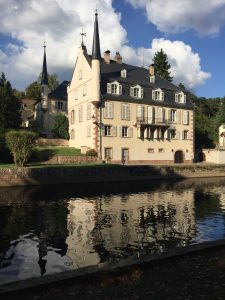
The Klingenthal Colloquy, organised by CoGREE and ICCS, and made possible through the generosity of the Goethe Foundation, gathers every two years in the tranquil surroundings of the Chateau Klingenthal in Alsace. A feature of Klingenthal is the generous hospitality in the form of comfortable surroundings, generous servings of food and wine that nourish the body while the generous hospitality of ideas takes shape. It is this generosity of spirit that is a feature of all of our exchanges.
The theme for this year’s gathering was ‘Committed to Europe’s Future – Challenges and Opportunities for Religion in Education’. We began with some inspirational thoughts from Fr. Heikki Huttunen, General Secretary of CEC, who reflected on “What future for Europe? Reaffirming the European project as
building a community of values”. Amidst a lively discussion about values, the value of hope as part of the educational project of the churches became a talking point. In a way this is what unites all the members of the colloquy – this bruised but undimmed hope that through dialogue between politics, churches, cultures, and communities we can have an open and hospitable Europe that allows all people to live life to its fullest.
It is always fascinating to learn of the work of various organisations present at the colloquy: Hanna Broadbridge reported on Education for Democratic Citizenship as seen through the eyes of CEC. One of my favourite parts of the Colloquy is when members of the group volunteer to share something of their own situation or practice. Laima Geikina gave us a heartfelt account of some of the issues facing RE in Latvia particularly as this pertains to the issue of gender, sexuality and marriage. Hanne Hjørlund and Hanna Broadbridge gave us an overview of an intriguing Danish project of intercultural education “Teaching – Not Preaching”. Sandra Cullen presented a brief overview of the current discussion about the nature of school patronage in Ireland and the potential implications of this discussion for RE. The resonances between this and Wim Kuiper’s presentation on Catholic/Christian education and RE in the Netherlands made for some engaging dialogue. David Lankshear reported on the findings of an empirical research project into the attitudes of primary school children to their schools. He reflected on this in terms of pupils’ attitudes to school ethos, school
worship, well-being and attitude to Christianity. This project reminded me again of how often the voices of our students are missing from our discussions about the nature, form and task of RE. Annette Deschner gave an account of her involvement with ‘Cultureshake’ an Erasmus+ Project that attempts to bridge the gap between theory and practice in the field of linguistic and cultural diversity. Annette helped us to draw out some of the implications of this project for practice in RE.
On Thursday it has become tradition that we are welcomed to the Council of Europe; this year we met in the European Youth Centre. Our session was chaired by Matthew Johnson, Director of Education, who with a number of Council of Europe staff presented a number of initiatives of the Council that have relevance for much of the work that we are engaged in. What was particularly useful was to receive the recent document Competences for Democratic Culture: Living Together as Equals in Culturally Diverse Democratic Societies http://www.coe.int/t/dg4/education/Source/competences/CDC_en.pdf
